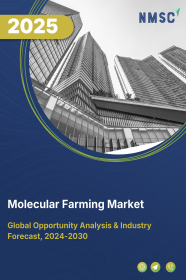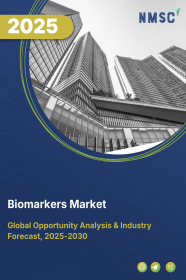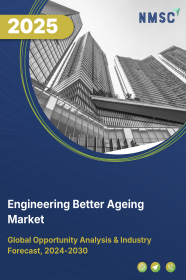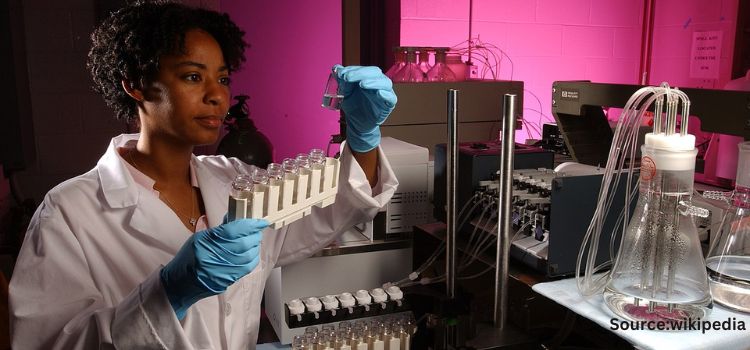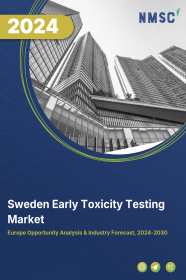
Sweden Early Toxicity Testing Market by Technique (In Vivo, In Vitro and In Silico), by Toxicity Endpoint (Genotoxicity, Dermal Toxicity, Skin Toxicity, Ocular Toxicity, Phototoxicity, and Others), and by End-User (Pharmaceutical Industry, Cosmetic Industry, Chemical Industry, Food Industry, and Others) – Opportunity Analysis and Industry Forecast, 2025–2030
Industry: Healthcare | Publish Date: 22-May-2025 | No of Pages: 147 | No. of Tables: 112 | No. of Figures: 57 | Format: PDF | Report Code : HC742
US Tariff Impact on Sweden Early Toxicity Testing Market
Trump Tariffs Are Reshaping Global Business
Sweden Early Toxicity Testing Industry Overview
The Sweden Early Toxicity Testing Market size was valued at USD 6.3 million in 2024, and is predicted to reach USD 19.1 million by 2030, at a CAGR of 20.4% from 2025 to 2030.
The early toxicity testing market in Sweden is poised for growth, driven by rising government expenditure and increasing investments in research and development. However, stringent regulatory restrictions present a significant challenge. The integration of new technologies, such as 3D cell culture in in-vitro testing, offers promising opportunities for improving the accuracy and dependability of toxicity testing.
This advancement is expected to drive market expansion in the coming years. Leading companies like Merck KGaA, Thermo Fisher Scientific, Eurofins Scientific, PerkinElmer, Inc., Bio-Rad Laboratories, Inc., and others are actively engaging in product launches and collaborations across various regions to maintain competitive positions.
These initiatives are expected to accelerate the adoption of early toxicity testing methods, enabling faster identification of safety issues. With the advancement of 3D cell culture technology, clinical trial risks are reduced, ensuring product safety and regulatory compliance while addressing ethical concerns due to non-animal testing methods, ultimately propelling the sweden early toxicity testing market demand.
Rising Government Expenditure Fuels Market Growth
The increase in government investment in Sweden's healthcare sector is a major driver of the early toxicity testing market growth. Government funding for medical infrastructure, advanced healthcare facilities, and research initiatives supports the development of new drugs and treatments.
This surge in government support accelerates drug development activities, leading to an increased demand for early toxicity testing to ensure the safety and efficacy of these new medications. As a result, market growth is significantly enhanced.
Increasing Investment in Research and Development of New Drugs Drives Market Growth
The rise in government investment in research and development (R&D) is another key factor fueling the early toxicity testing market in Sweden. With increased funding for R&D, new testing methodologies are being developed, enabling more accurate and efficient results.
Furthermore, this investment accelerates the development of new tools and techniques for toxicity testing, reducing testing times and improving the ability to assess the safety of chemicals and pharmaceuticals.
In 2022 alone, Swedish pharmaceutical companies focused on R&D for 1,402 new drugs and vaccines, a testament to the country's commitment to innovation. This cycle of innovation further supports the growth and expansion of the early toxicity testing market.
Stringent Regulatory Restrictions Restrain the Sweden Early Toxicity Testing Market Expansion
The early toxicity testing market in Sweden faces challenges due to stringent regulatory restrictions. Regulatory agencies such as the European Medicines Agency (EMA) impose rigorous testing protocols, requiring extensive preclinical and clinical evaluations.
These lengthy approval processes delay the introduction of new drugs and therapies, reducing the demand for early toxicity testing solutions. As a result, regulatory hurdles slow the market's growth potential, despite increasing investments and advancements in testing technologies.
Integration of 3D Cell Culture Technology Creates Growth Opportunities
The integration of 3D cell culture technology into in-vitro toxicity testing is anticipated to create significant growth opportunities in the future. These advanced models provide a more realistic simulation of human tissues, accurately mimicking the complex interactions within organs.
As a result, 3D cell cultures deliver more consistent and reliable toxicity testing outcomes than traditional 2D cell cultures, enhancing drug safety predictions and minimizing the reliance on animal testing. This innovation will accelerate early-stage drug development and improve the identification of potential safety risks, ultimately driving the Sweden early toxicity testing market growth.
Competitive Landscape
The promising players operating in the Sweden early toxicity testing industry includes Merck KGaA, Thermo Fisher Scientific, Eurofins Scientific, PerkinElmer, Inc., Bio-Rad Laboratories, Inc., Agilent Technologies, Inc., Bruker Corporation, AstraZeneca, Recipharm, BioInvent International, Cambrex Corporation, Linical Co. Meditrial, Truly Translational, Nordic Preclinical Sciences, Svar Life Science, and others.
Sweden Early Toxicity Testing Market Key Segments
By Technique
-
In Vivo
-
In Vitro
-
Cell Culture
-
PCR
-
ELISA
-
Western Blotting
-
Protein Binding Assays
-
-
In Silico
By Toxicity Endpoint
-
Genotoxicity
-
Dermal Toxicity
-
Skin Toxicity
-
Ocular Toxicity
-
Phototoxicity
-
Others
By End-User
-
Pharmaceutical Industry
-
Cosmetic Industry
-
Chemical Industry
-
Food Industry
-
Others
Key Players
-
Merck KGaA
-
Thermo Fisher Scientific
-
Eurofins Scientific
-
PerkinElmer, Inc.
-
Bio-Rad Laboratories, Inc.
-
Agilent Technologies, Inc.
-
Bruker Corporation
-
AstraZeneca
-
Recipharm
-
BioInvent International
-
Cambrex Corporation
-
Linical Co. Meditrial
-
Truly Translational
-
Nordic Preclinical Sciences
-
Svar Life Science
REPORT SCOPE AND SEGMENTATION:
|
Parameters |
Details |
|
Market Size Value in 2024 |
USD 6.3 million |
|
Revenue Forecast in 2030 |
USD 19.1 million |
|
Value Growth Rate |
CAGR of 20.4% from 2025 to 2030 |
|
Analysis Period |
2024–2030 |
|
Base Year Considered |
2024 |
|
Forecast Period |
2025–2030 |
|
Market Size Estimation |
Million (USD) |
|
Growth Factors |
|
|
Companies Profiled |
15 |
|
Market Share |
Available for 10 companies |
|
Customization Scope |
Free customization (equivalent up to 80 working hours of analysts) after purchase. Addition or alteration to country, regional, and segment scope. |
|
Pricing and Purchase Options |
Avail customized purchase options to meet your exact research needs. |

















 Speak to Our Analyst
Speak to Our Analyst



